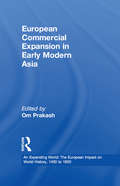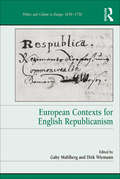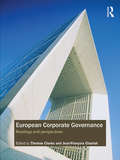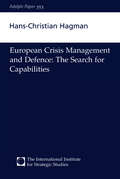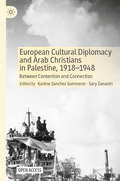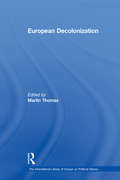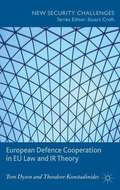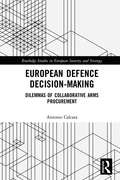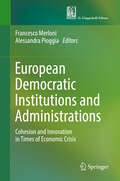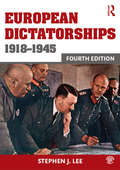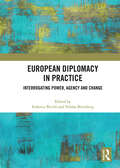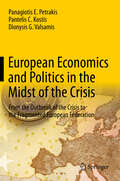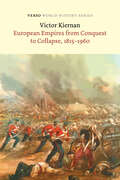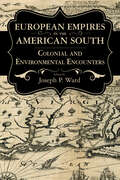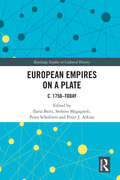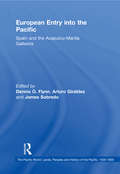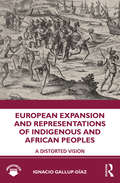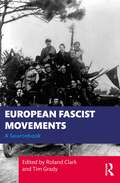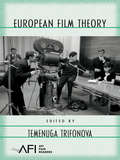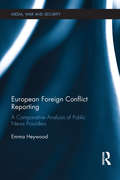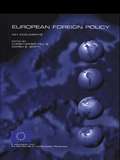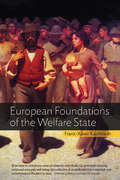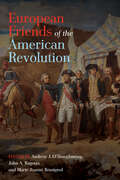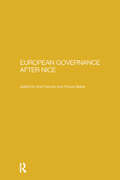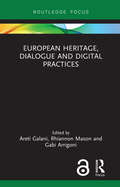- Table View
- List View
European Commercial Expansion in Early Modern Asia (An Expanding World: The European Impact on World History, 1450 to 1800 #10)
by Om PrakashRegular commercial contacts between Europe and Asia date back to at least the early years of the Christian era, but the pattern of trade underwent a structural modification following the Portuguese discovery of a route to the East Indies via the Cape of Good Hope. This volume illustrates the consequences of the arrival of large numbers of Europeans in the East. Europeans both participated in, modified and exploited existing trade relationships in the Indian Ocean and the Pacific. The studies reprinted here show how some environments, such as Japan, were hostile, whilst most states welcomed the European commercial contact. The necessity for Europeans to pay for Asian goods using precious metals is emphasised by the inclusion of articles in monetary transfers in Asian trade, a phenomenon which provides a link between economic developments in the Americas and those in Asia from the 16th century onwards.
European Contexts for English Republicanism (Politics and Culture in Europe, 1650-1750)
by Gaby Mahlberg Dirk WiemannEuropean Contexts for English Republicanism offers new perspectives on early modern English republicanism through its focus on the Continental reception of and engagement with seventeenth-century English thinkers and political events. Looking both at political ideas and at the people that shaped them, the collection examines English republican thought in its wider European context during the later seventeenth and eighteenth century. In a number of case studies, the contributors assess the different ways in which English republican ideas were not only shaped by the thought of the ancients, but also by contemporary authors from all over Europe, such as Hugo Grotius or Christoph Besold. They demonstrate that English republican thinkers did not only act in dialogue with Continental authors and scholars, their ideas in turn also left a long-lasting legacy in Europe as they were received, transformed and put to new uses by thinkers in France, Italy, the Netherlands, Germany and Poland. Far from being an exclusively transatlantic affair, as much of the established scholarship suggests, English republican thought also left its legacy on the European Continent, finding its way into wider debates about the rights and wrongs of the English Civil War and the nature of government, while later translations of English republican works also influenced the key thinkers of the French Revolution and the liberals of the nineteenth century. Bringing together a range of fresh and original essays by British and European scholars in the field of early modern intellectual history and English studies, this collection of essays revises a one-sided approach to English republicanism and widens the scope of study beyond linguistic and national boundaries by looking at English republicans and their continental networks and legacy.
European Corporate Governance: Readings and Perspectives
by Thomas Clarke Jean-François ChanlatFor decades, Europe has sought to become more financially integrated with the United States and thus European legal institutions, regulatory, governance and accounting practices have faced pressures to adapt to international competitive markets. Against this backdrop, European corporate governance systems have been criticized as being less efficient than the Anglo-American market based systems. This textbook examines the unique dimensions and qualities of European corporate governance. Reforms of key institutions, the doctrine of shareholder value and the seemingly irresistible growth of CEO power and reward are critically analyzed. The book brings out the richness of European corporate governance systems, as well as highlighting historical weaknesses that will require further work for a sustainable corporate governance environment in the future. In light of the most severe financial crisis since the 1930s, this intelligent look at European corporate governance is a vital textbook for courses on corporate governance and a great supplementary textbook on a host of business, management and accounting classes.
European Crisis Management and Defence: The Search for Capabilities (Adelphi series)
by Hans-Christian HagmanAssesses the EU and NATO's tools to prevent conflicts and manage international crises. It offers a unique insight into European security policy and questions the realism of the political goals. It argues for more coordination among European states, and an enhancement of the EU's strategic decision-making capabilities.
European Cultural Diplomacy and Arab Christians in Palestine, 1918–1948: Between Contention and Connection
by Karène Sanchez Summerer Sary ZananiriThis open access book investigates the transnationally connected history of Arab Christian communities in Palestine during the British Mandate (1918-1948) through the lens of the birth of cultural diplomacy. Relying predominantly on unpublished sources, it examines the relationship between European cultural agendas and local identity formation processes and discusses the social and religious transformations of Arab Christian communities in Palestine via cultural lenses from an entangled perspective. The 17 chapters reflect diverse research interests, from case studies of individual archives to chapters that question the concept of cultural diplomacy more generally. They illustrate the diversity of scholarship that enables a broad-based view of how cultural diplomacy functioned during the interwar period, but also the ways in which its meanings have changed. The book considers British Mandate Palestine as an internationalized node within a transnational framework to understand how the complexity of cultural interactions and agencies engaged to produce new modes of modernity.
European Decolonization (The International Library of Essays on Political History)
by Martin ThomasThis collection brings together twenty-one key articles that explore the nature and impact of colonial withdrawal. Ranging across all the European colonial powers, the articles discuss various aspects of decolonization, including the role of political violence, changing popular attitudes to empire and the inter-actions between colonial conflict and Cold War.
European Defence Cooperation in EU Law and IR Theory
by Tom Dyson Theodore KonstadinidesThis book offers a novel contribution to the study of post-Cold War European defence. Interdisciplinary in approach, it uses European law to assess the utility of existing theoretical accounts. By exploring the balance of threat theory, it provides new insights into the forces driving and hindering European defence cooperation.
European Defence Decision-Making: Dilemmas of Collaborative Arms Procurement (Routledge Studies in European Security and Strategy)
by Antonio CalcaraThis book comparatively examines the preferences of four key arms-producing states towards European joint armaments programmes. The European defence market is characterised by a mixture of inter-state competition and European cooperation, and this work assesses why countries sometimes decide to cooperate with their partners, while in other instances they refrain from doing so. In order to shed light on this empirical puzzle, the book focuses on state-defence industry relations in the four major European arms producers: France, Germany, Italy and the UK. The main argument is that the public or private governance of industrial suppliers and market size are the two decisive variables that explain the simultaneous presence of cooperation and competition in European defence procurement. Specifically, it argues that in public governance ecosystems, arms industries are able to "capture" the state's decision-making processes to their own advantage. In private governance ecosystems, the state is relatively autonomous from defence industry's influence and able to pursue larger macro-economic and military benefits. Moreover, the strategy pursued by governments and defence firms is decisively shaped by market size because of its importance in determining the relative costs and benefits of collaborative arrangements. This book will be of much interest to students of EU policy, defence studies, European politics and International Relations.
European Democratic Institutions and Administrations: Cohesion and Innovation in Times of Economic Crisis
by Francesco Merloni Alessandra PioggiaThis book presents the results of extensive international comparative research into the effects of the economic and financial crisis on democratic institutions and social cohesion policies. The collected studies describe and analyse the measures (often referred to as "reforms") adopted to counter the crisis and the effects of these measures.It investigates three areas: the impact on the functioning of institutions, with respect to the relationship between representative institutions and governments, and the organisational structure of administrations at national and local levels; the impact that the austerity policies on public spending have on social rights; and the impact on traditional instruments of public action (administrative simplification, public services delivering, the use of common assets).The general findings highlight the effect of reducing the administrative and government capacity of the democratic institutions: the public sector, rather than being innovative and made more effective, declines, offering increasingly poor public services and making bad decisions, fuelling substantive or formal privatisation solutions, which in turn cause further weakening.
European Dictatorships 1918–1945
by Stephen J. LeeEuropean Dictatorships 1918-1945 surveys the extraordinary circumstances leading to, and arising from, the transformation of over half of Europe's states to dictatorships between the first and the second world wars. From the notorious dictatorships of Mussolini, Hitler and Stalin to less well-known states and leaders, Stephen J. Lee scrutinizes the experiences of Russia, Germany, Italy, Spain, Portugal and Central and Eastern European states. This fourth edition has been fully revised and updated throughout. New material for this edition includes: the most recent research on individual dictatorships a new chapter on the experiences of Europe's democracies at the hands of Germany, Italy and Russia an expanded chapter on Spain a new section on dictatorships beyond Europe, exploring the European and indigenous roots of dictatorships in Latin America, Asia and Africa. Extensively illustrated with images, maps, tables and a comparative timeline, and supported by a companion website providing further resources for study (www.routledge.com/cw/lee), European Dictatorships 1918-1945 is a clear, detailed and highly accessible analysis of the tumultuous events of early twentieth-century Europe.
European Diplomacy in Practice: Interrogating Power, Agency and Change
by Federica Bicchi Niklas BrembergThis book aims to show practice approaches at work in the fields of European diplomacy and security broadly conceived. It sets out to provide readers with a hands-on sense of where research on social practices and European diplomacy, security and foreign policy currently stands. The book reviews how practice approaches have evolved in International Relations (IR) and brings together an unique set of contributions which highlights how insights from practice approaches can be applied to advance research on a number of key issues in these fields. While the debate about practices in IR goes beyond the case of diplomacy, the latter has become a showcase for the former and this book continues the debate on practices and diplomacy by zooming in on the European Union. Examples of issues covered include the evolution of EU-NATO relations seen from the perspective of communities of practice, burden sharing as an anchoring practice for European states’ involvement in crisis management operations, the practical knowledge shaping the EU’s responses to the Arab Uprisings, agency as accomplished in and through EU counter-piracy practices and the political resistance to Israeli occupation and the non-official recognition of Palestine performed by EU diplomats. Thus, by focusing on specific practices and analytical mechanisms that contribute to understand the transformations of European diplomacy, security and foreign policy, this book provides essential readings to anyone interested in innovative ways to grasp the contemporary challenges that face the EU and its member states. The chapters originally published as a special issue of European Security.
European Economics and Politics in the Midst of the Crisis
by Panagiotis E. Petrakis Pantelis C. Kostis Dionysis G. ValsamisThis book presents an overview of the economics and politics implemented in the European Union and especially the Eurozone during the crisis of 2008-2012. Although it focuses on these four years, the analysis starts from the establishment of the European Union and covers the period up to the outbreak of the Cypriot banking crisis in mid-2013. The long-term creation of structural changes in European economics and politics is associated with a growth lag within the global economic environment dynamics. The economic and political consequences of the crisis and the development of new institutions will shape the future growth dynamics towards a Fragmented European Federation.
European Empires from Conquest to Collapse, 1815-1960
by V.G. KiernanNew edition of a trail-blazing history of imperial warfareEuropean Empires from Conquest to Collapse is a vivid anticolonial reckoning with the history of imperial warfare. Global in scope, it deftly surveys the fighting forces and military engagements of the Great Powers, from the British in India to the scramble for Africa. Victor Kiernan lays bare the doctrines and realities of colonial fighting, dispelling official legends. Europe often boasted that coloni- alism was &‘civilised&’, but the facts show it could be barbaric. Kiernan traces how guerrilla insurgency against colonial oppression developed into one of the most sophisticated branches of the art of war.With a foreword by Tariq Ali, author of Winston Churchill: His Times, His Crimes.
European Empires in the American South: Colonial and Environmental Encounters (Chancellor Porter L. Fortune Symposium in Southern History Series)
by Joseph P. WardContributions by Allison Margaret Bigelow, Denise I. Bossy, Alejandra Dubcovsky, Alexandre Dubé, Kathleen DuVal, Jonathan Eacott, Travis Glasson, Christopher Morris, Robert Olwell, Joshua Piker, and Joseph P. Ward European Empires in the American South examines the process of European expansion into a region that has come to be known as the American South. After Europeans began to cross the Atlantic with confidence, they interacted for three hundred years with one another, with the native people of the region, and with enslaved Africans in ways that made the South a significant arena of imperial ambition. As such, it was one of several similarly contested regions around the Atlantic basin. Without claiming that the South was unique during the colonial era, these essays make clear the region’s integral importance for anyone seeking to shed new light on the long-term process of global social, cultural, and economic integration. This volume includes essays on all three imperial powers, Spain, Britain, and France, and their imperial projects in the American South. While the consequences of Indian encounters with European invaders have long remained a principal feature of historical research, this volume advances and expands knowledge of Native Americans in the South amid the Atlantic World.
European Empires on a Plate: c. 1750–Today (Routledge Studies in Cultural History)
by Peter Scholliers Peter J. Atkins Ilaria Berti Stefano MagagnoliThis book uses food to explore the uneven and multifaceted encounters between European imperial societies and their colonies, examining the cultural, social, political and economic forces behind European empires.Food is a key focus of current transdisciplinary and border research, and these chapters uncover hidden aspects of imperial dynamics and the search for food in European expansion. Containing contributions from a mix of established food historians and young researchers in the field, the collection utilizes a range of sources including colonial government records, trademark and patent records, cookery books, agronomic and botanical treaties, television shows, newspaper and magazine articles and advertisements. While the book discusses empires’ influence on the colonies and their foodways, it also reveals inter-imperial connections and interdependence by highlighting the effect of colonial foods on the metropoles.European Empires on a Plate is a valuable resource for scholars in the fields of food history, food studies and food culture, as well as social and cultural historians.
European Entry into the Pacific: Spain and the Acapulco-Manila Galleons (The Pacific World: Lands, Peoples and History of the Pacific, 1500-1900 #4)
by Dennis O. Flynn Arturo GiráldezWorld history conventionally ignores or underestimates the importance of Manila, the Manila galleons, and the Philippines as key stages in the development of trans-Pacific contact and of the world economy. Essays in this volume discuss Philippine-Asian exchanges prior to the entry of Europeans, and then look at European influences and the impact of Magellan’s voyage, and the emergence of Manila as one of global trade’s crucial linchpins during four centuries. Linkages between Latin America and China, and Spanish-Japanese competition for the Chinese marketplace are important topics. Tensions and cooperation among Chinese, Japanese, Iberians, Africans, Christians, Muslims and others on Philippine soil are also covered. This volume suggests the need for thorough re-evaluation of the Philippines’ central role in terms of both Pacific history and global history as perhaps the single most important stage in the traffic that linked China and Latin America.
European Expansion and Representations of Indigenous and African Peoples: A Distorted Vision
by Ignacio Gallup-DíazThis book presents a bold, multifaceted interpretation of early English imperial actions by examining the ways in which English empire-builders and travelers interacted with Indigenous and African peoples during the long process of colonization in the Americas. Ignacio Gallup-Díaz argues that early English imperial actors were primarily motivated by practical concerns rather than abstract ideologies—from reacting to, learning from, and avoiding the ongoing Spanish and Portuguese imperial projects to the dynamic collision of English imaginings of empire with the practical realities of governing non-European peoples. The text includes an appendix of primary sources that allows students and instructors to engage with English imperial thinking directly. Readers are encouraged to critically examine English accounts of this period in an attempt to see the Indigenous and African peoples who are embedded in them. European Expansion and Representations of Indigenous and African Peoples provides an invaluable new framework for undergraduate students and instructors of early American history, Atlantic history, and the history of race and imperialism more broadly.
European Fascist Movements: A Sourcebook
by Tim Grady Roland ClarkThis volume offers a fresh and original collection of primary sources on interwar European fascist movements. These sources reflect new approaches to fascism that emphasise the practical, transnational experience of fascism as a social movement, contextualising ideological statements within the historical moments they were produced. Divided into 18 geographically based chapters, contributors draw together the history of various fascist and right-wing movements, selecting sources that reflect themes such as transnational ties, aesthetics, violence, female activism, and the instrumentalisation of race, gender, and religion. Each chapter provides a chronological, narrative account of movements interspersed with complete primary sources, from political speeches, internal movement circulars and articles, police reports, oral history, songs and music, photographs, artworks, poetry, and anti-fascist sources. The volume as a whole seeks to introduce readers to the diversity of fascist groups across the continent, to show how fascist groups were constituted through social bonds, rather than around fixed ideologies, and to capture the inexperience and ad hoc character of early fascist groups. With an Introduction that explains the volume’s theoretical approach and elaborates on the chronology of European fascism, this is the perfect sourcebook for any student of Modern European history and politics.
European Film Theory (AFI Film Readers)
by Temenuga TrifonovaEuropean Film Theory explores the ‘Europeanness’ of European film theory, its philosophical origins, the ‘culture wars’ between ‘Continental’ and ‘Analytical’ film theory and philosophy, the major discursive and epistemological shifts in the history of Continental film theory, the relationship between Continental philosophy of art and philosophy of history and European film theory. Writing from a range of disciplines and perspectives, the contributors to this new volume in the AFI FILM READERS series offer fresh interpretations of European film theorists and illuminate the political potential of European film theory.
European Foreign Conflict Reporting: A Comparative Analysis of Public News Providers (Media, War and Security)
by Emma HeywoodThis book explores the state of European foreign conflict reporting by public-sector broadcasters, post-Cold war and post-9/11. It compares the values of three television news providers from differing public systems: BBC’s News at 10, Russia’s Vremya and France 2’s 20 Heures. The book examines how these three news providers have reported and broadcast the ongoing Israeli–Palestinian conflict, which pre-dates both the change in East-West relations and the events of 9/11. In doing so, the work identifies and analyses the role of public and state-aligned broadcasters and illustrates how certain news values are consistently prioritised by the broadcasters and the effect this has on how news stories are portrayed. The book is divided into two parts. Part I focuses on 2006 to 2008 and provides a detailed quantitative overview of the broadcasters’ news values. Part II provides an update of the analysis by examining coverage of the war in Gaza 2014 and discusses the findings from audience research into perceptions of this latter war. This book explains that not only do hierarchies in news values exist in foreign conflict reporting but that they are never arbitrary and can be explained, in part, by the structure of the broadcasters and by events occurring within, or associated with, the reporting country, resulting in nationally differentiated perceptions of conflict throughout the world. This book will be of much interest to students of media studies, war and conflict studies, Middle East politics and international relations in general.
European Foreign Policy: Key Documents
by Christopher Hill Karen E. SmithThis book is the very first to collect together the key official documents tracing the development of European foreign policy from the end of the Second World War to the present day. It contains: *all important documents on European foreign policy from 1948 to the Kosovo crisis *material from major treaties such as The North Atlantic treaty, the treaty of Rome and the treaty of Amsterdam *European responses to major world events such as the Middle East peace process, the Falklands war and the Balkans crisis *detailed commentary and analysis of the documents providing a valuable political and historical context *many documents which are extremely difficult to obtain elsewhere. The unparalleled coverage makes this book an essential primary source for all those interested in European politics and International Relations.
European Foundations Of The Welfare State
by Franz-Xaver KaufmannWhile social welfare programs, often inspired by international organizations, are spreading throughout the world, the more far-reaching notion of governmental responsibility for the basic well-being of all members of a political society is not, although it remains a feature of Europe and the former British Commonwealth. The welfare state in the European sense is not simply an administrative arrangement of various measures of social protection but a political project embedded in distinct cultural traditions. Offering the first accessible account in English of the historical development of the European idea of the welfare state, this book reviews the intellectual foundations which underpinned the road towards the European welfare state, formulates some basic concepts for its understanding, and highlights the differences in the underlying structural and philosophical conditions between continental Europe and the English-speaking world.
European Friends of the American Revolution (The Revolutionary Age)
by John A. Ragosta Andrew J. O’Shaughnessy Marie-Jeanne RossignolEurope’s crucial contribution to the achievement of American independence.American independence would not have been achieved without diplomatic, financial, and military support from Europe. And without recognition from powerful European nations, the young country would never have assumed an independent status "amongst the powers of the earth." This collection of essays not only offers new glimpses into the ways in which various European powers and actors enabled American patriots to fight and win the war, it also highlights the American Revolution’s short- and long-term impact on the Atlantic world.Because of the strength of European support, Great Britain found itself diplomatically isolated, without an ally in a war that had become a global conflict, and with a navy outnumbered by the combined fleets of America’s friends. This volume is a timely reminder of the importance of international support for the winning of American independence and the global context of the American Revolution as we approach its 250th anniversary.Contributors: Olivier Chaline, Sorbonne Université * Robert Rhodes Crout, College of Charleston * Kathleen DuVal, University of North Carolina at Chapel Hill * Victor Enthoven, Vrije Universiteit Amsterdam * Paul A. Gilje, University of Oklahoma * Jean-Marie Kowalski, Sorbonne Université * Andrew J. O’Shaughnessy, University of Virginia * Julia Osman, Mississippi State University * Munro Price, University of Bradford * Gonzalo M. Quintero Saravia, Senior Spanish diplomat * John A. Ragosta, Robert H. Smith International Center for Jefferson Studies at Monticello * Marie-Jeanne Rossignol, Université Paris Cité * Timothy D. Walker, University of Massachusetts Dartmouth
European Governance After Nice (Waseda/routledgecurzon International Ser. #Vol. 4)
by Koji Fukuda and Hiroya AkibaWhat is the impact of institutional reform implemented by the Nice Treaty on European Governance? What should be done to enhance democratic legitimacy in the EU? This book provides an up-to-date guide to understanding the European Union as an institution. Globalisation has led to enormous changes in the international environment which, in turn, have demanded institutional reform of the European Union in the form of the Nice Treaty. European Governance After Nice scrutinises how, and to what extent, the treaty will contribute to the solution of existing problems, examining both its positive effects and its limitations and examines the reforms within the EU through political science, law and economics, in order to express the full extent of the different effects of the Nice Treaty on non-member as well as member countries. The contributors suggest that the threat of varying exchange rates in the future, when the Treaty has an expansionary effect on economic scale, will lead to a deepening interdependence between the excluded countries.
European Heritage, Dialogue and Digital Practices (Critical Heritages of Europe)
by Rhiannon Mason Areti Galani Gabi ArrigoniEuropean Heritage, Dialogue and Digital Practices focuses on the intersection of heritage, dialogue and digital culture in the context of Europe. Responding to the increased emphasis on the potential for heritage and digital technologies to foster dialogue and engender communitarian identities in Europe, the book explores what kind of role digital tools, platforms and practices play in supporting and challenging dialogue about heritage in the region.Drawing on fieldwork involving several European museums and heritage organisations, the chapters in this volume critically engage with the role of digital technology in heritage work and its association with ideas of democratisation, multivocality and possibilities for feedback and dialogic engagement in the emerging digital public sphere. The book also provides a framework for understanding dialogue in relation to other commonly used approaches in heritage institutions, such as participation, engagement and intercultural exchange. The authors map out the complex landscape of digitally mediated heritage practices in Europe, both official and unofficial, by capturing three distinct areas of practice: perceptions and applications of digitally mediated dialogues around heritage within European museums and cultural policy, facilitation of dialogue between European museums and communities through participatory design approaches and non-official mobilisation of heritage on social media. European Heritage, Dialogue and Digital Practices will be of interest to both scholars and students in the fields of heritage and museum studies, digital heritage, media studies and communication, the digital humanities, sociology and memory studies. The book will also appeal to policy makers and professionals working in a variety of different fields.
